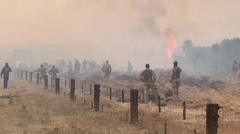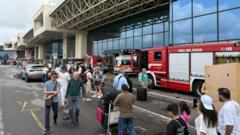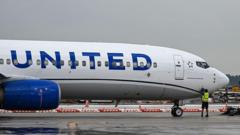Heathrow Airport's recent closure due to a fire at an electrical substation has highlighted concerns over the resilience and security of the airport's power supply. Nigel Wicking, chief executive of the Heathrow Airline Operators’ Committee, revealed to a parliamentary committee that he had alerted officials about the vulnerabilities of the substations just days prior to the incident that occurred on March 21.
The fire cut power to Europe’s busiest airport, causing significant disruptions and baffling travelers worldwide. Wicking stated that if configured better, operations could have resumed sooner as stranded flights could have been redirected to one of Heathrow's five terminals. This incident not only disrupted travel plans but also raised serious questions about the adequacy of Heathrow's infrastructure and its ability to withstand power failures.
The aftermath of the fire has prompted discussions about the financial implications of bolstering backup systems, with estimates suggesting that an investment of up to $100 million may be necessary to ensure smoother operations during emergencies. Experts warned it could take years to implement these enhancements. Moreover, Wicking mentioned previous incidents of theft that impacted the power supply, urging immediate attention to the airport's vulnerabilities, given its pivotal role in global air travel.
As Heathrow works to recover from this incident and reassess its infrastructure, concerns remain regarding the adequacy of measures to ensure the airport can withstand future challenges. The story continues to evolve, with updates anticipated in the coming days.
The fire cut power to Europe’s busiest airport, causing significant disruptions and baffling travelers worldwide. Wicking stated that if configured better, operations could have resumed sooner as stranded flights could have been redirected to one of Heathrow's five terminals. This incident not only disrupted travel plans but also raised serious questions about the adequacy of Heathrow's infrastructure and its ability to withstand power failures.
The aftermath of the fire has prompted discussions about the financial implications of bolstering backup systems, with estimates suggesting that an investment of up to $100 million may be necessary to ensure smoother operations during emergencies. Experts warned it could take years to implement these enhancements. Moreover, Wicking mentioned previous incidents of theft that impacted the power supply, urging immediate attention to the airport's vulnerabilities, given its pivotal role in global air travel.
As Heathrow works to recover from this incident and reassess its infrastructure, concerns remain regarding the adequacy of measures to ensure the airport can withstand future challenges. The story continues to evolve, with updates anticipated in the coming days.




















